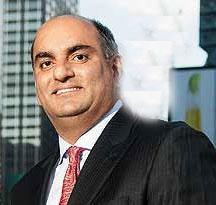Mohnish Pabrai whose company handles funds to the tune of $464 mn spoke at length about his investment decisions in Mumbai
 In a world where mathematical models dominate Dalal Street decisions, and investment management firms are buried under a sea of information and data from television screens and Bloomberg terminals, Mohnish Pabrai has a particularly minimalist approach to stock market investing.
In a world where mathematical models dominate Dalal Street decisions, and investment management firms are buried under a sea of information and data from television screens and Bloomberg terminals, Mohnish Pabrai has a particularly minimalist approach to stock market investing.
Dalal Street LLC, where Pabrai is managing partner, has assets of $464 million, according to data filed with the United States Securities and Exchange Commission in 2014. He is also the author of the value investing tome -The Dhandho Investor.
There are a lot of factors in evaluating a business and not all of it is quantitative, he said, while speaking at a value investing summit. His equivalent of the mathematical model is a four or five-sentence paragraph summing up the reason a stock is attractive.
When asked about the effect of earnings multiples on his investment decisions, he said it doesn't make sense to get too hung up on numbers such as price-to-earnings(P/E) or price-to-book (P/B); they should be an aid to understand the business and should not be the be-all and end-all of your analysis. He suggested it might not make sense to buy above a certain P/E or sell below it, just on the basis of the numbers.
In fact, Pabrai takes this one step further. He rarely uses Excel when making investment decisions. If he finds himself reaching for it, he treats it as a red flag. Such businesses are probably a pass, he said.
 Pabrai's (left) reluctance to deal with complicated businesses is also related to his principle of sticking to his circle of competence. And it is not just him who has made money doing so, he explained in an example of a friend who understood technology. He spotted an opportunity after the release of the first iPhone. He knew the move marked a paradigm shift in technology. The friend subsequently invested heavily in the company making the phone, and rode the wave as Apple grew to the behemoth it is today.
Pabrai's (left) reluctance to deal with complicated businesses is also related to his principle of sticking to his circle of competence. And it is not just him who has made money doing so, he explained in an example of a friend who understood technology. He spotted an opportunity after the release of the first iPhone. He knew the move marked a paradigm shift in technology. The friend subsequently invested heavily in the company making the phone, and rode the wave as Apple grew to the behemoth it is today.
Pabrai too sticks to his circle of competence, which includes financials. Interestingly, he also believes in having a concentrated portfolio portfolio of stocks in businesses that he understands; rather than a large number of stocks which may include a number of businesses that he does not understand as well.
His SEC filings show only eight securities in his entire portfolio. Instead of buying in and out of a large number of stocks, he believes in buying and sitting on good businesses that he understands when they are available at a good price.
Pabrai gave the example of Fidelity Investments, which recently did a study of the clients who had the best returns in their portfolio. The biggest gains belonged to portfolios which had no churn in their holdings. The inactivity, it was discovered, was because the owners had actually passed away.
The second biggest gains were from clients who literally forgot about their portfolio. They didn't keep buying and exiting stocks either; because they didn't remember that they had a portfolio. It is important to remember that constant activity need not be a good thing, and can be detrimental in the investing world, he said. He pointed out that businesses take decades to undergo change, it does not happen at the pace that tickers flash across on your television screen.











